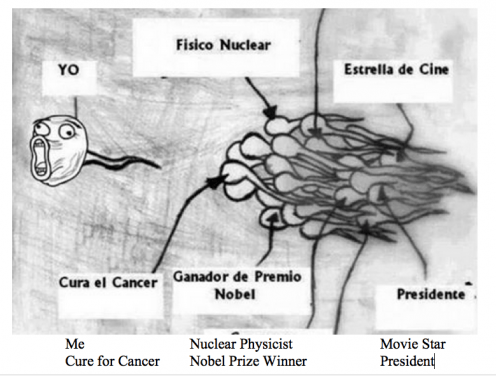Self-Deprication
By ucsanha, on 23 March 2015

I recently wrote about the ways that northern Chileans express normativity on social media, using Kermit the Frog and contrasts between “Expected” and “Reality” memes as examples. But perhaps what demonstrates a desire for normativity even further is the way many individuals in Alto Hospicio express self-deprecation.
Much like the contrasts between expectation and reality, self-deprecation memes work to set up a contrast between idealized subjects and normativity. They may present an example of ambition, success, or a luxury lifestyle, yet do so through a frame of exaggeration. They then place themselves as a representative of normality, which contrasts with the ridiculousness of the exaggeration. In doing so, the humorous context allows them to adhere to normativity in an active sense. Rather that it being an implicit contrast to ambition, normativity is actively cultivated as an important value.
The photo above is just one example of self-deprecation in which the sperm that fertilizes the egg somehow outruns those that could have produced exceptional offspring: a Nobel Prize winner, a president, a movie star. “Me” is contrasted with these exceptional possibilities and is thus assumed to represent the ultimate ordinary possibility.
Other forms of self-deprecation involve references to the imperfect body (“A man without a belly is like a sky without stars”), academic credentials (A cemetery headstone engraved with “Here lie my ambitions to study), or material possessions (A picture of a rusty broken down car overlaid with the words “What do you say if I try to seduce you in my car tonight?”). These examples present the person who posts them as representative of the ordinary person who doesn’t live up to ideals that are considered to be out of reach. Instead they frame these more ideal forms as ridiculous through distancing. Sometimes they even explicitly spell out the benefits of normativity. One popular meme reminds readers that “Being ugly and poor has its advantages, when someone falls in love with you, they do it from the heart.” Again the poster of the meme positions them as ugly and poor, yet expresses happiness because this verifies the authenticity of relationships. Being ordinary means one doesn’t have to worry about being liked only for superficial reasons.
Self-deprecating humor is especially important, because it allows divergent self-representations to surface in ways that may be more accessible (both to the person who expresses the sentiment as well as to their audience) than literal expressions of ambition. Self-deprecating humor allows for play without alienating the audience because that which is outside of normativity is presented in a nonthreatening way (Ritchie 2005:288). In the context of normativity in Alto Hospicio, joking is a safe, and obviously popular way for people to express things that might not be acceptable otherwise.
References:
David Ritchie “Frame-Shifting in Humor and Irony” Metaphor and Symbol 20 no. 4 (2005):275-294.
2 Responses to “Self-Deprication”
- 1
- 2
 Close
Close





RT @UCLSocNet: Self-Deprication http://t.co/4RizUpuX9J